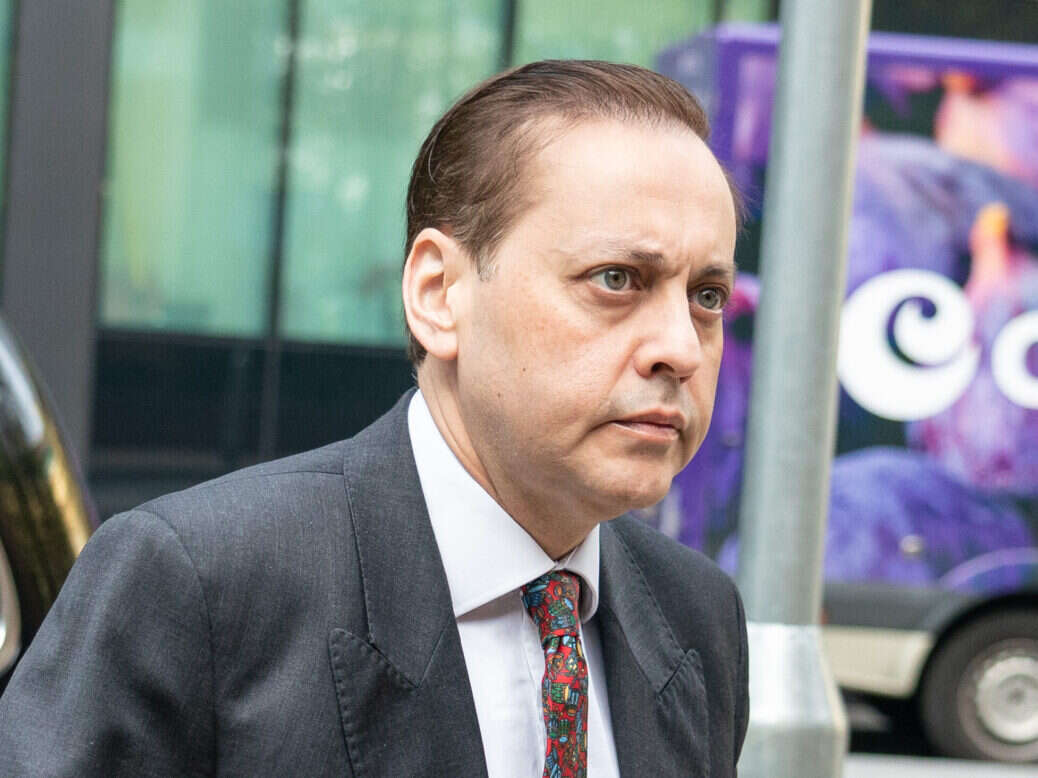
Tory MP Imran Ahmad Khan tweeted in support of press freedom on the day he tried to gag the media from reporting his name over a charge of sexually assaulting a schoolboy.
Imran Ahmad Khan, 48, also attempted to stop key details of the case – including the age of his victim, his own homosexuality, and even his fondness for a gin and tonic – coming into the public domain.
Disgraced Wakefield MP Khan was thwarted in his bid for secrecy unprecedented in a case not involving national security following two expensive legal challenges from media organisations.
The full details of how the story finally came to be told can be reported for the first time after he was found guilty of sexually assaulting a 15-year-old boy after a party in 2008.
The victim came forward days after Khan was elected in 2019 and gave three video-recorded interviews to police – two in December 2019 and one in February last year, when he drove almost 200 miles from his home during the pandemic’s second wave.
Khan was sent a questionnaire by Staffordshire Police rather than being interviewed under caution at a station because of “Covid protocols in place at the time”, providing written answers on 7 May 2020.
Neither Staffordshire Police nor the Crown Prosecution Service informed the media or the public when Khan was charged by postal requisition – the point at which suspects in criminal cases are routinely named.
His first appearance at Westminster Magistrates’ Court by videolink on 3 June last year did not appear on the public or press lists.
Chief Magistrate Paul Goldspring granted the MP an interim anonymity order ahead of another unlisted hearing, which the CPS refused to confirm was taking place as well as what charge Khan was facing.
On 17 June last year, the day Khan argued in court he should be granted anonymity, he retweeted then foreign secretary Dominic Raab’s message about “press freedom” in Hong Kong.
Khan had previously spoken in the Commons against Extinction Rebellion’s efforts to “constrain press freedom” after the protest group blocked a newspaper printing press.
His lawyers said that as a serving MP there were concerns about his safety and argued he should not be named in court because it would breach his right to life (Article 2), protection from “inhuman or degrading treatment” (Article 3) and right to a private life (Article 8) under the European Convention of Human Rights.
The application included statements from former British diplomat and intelligence officer Richard Barrett and former senior RAF officer Afzal Ashraf, a letter from DUP MP Jim Shannon on House of Commons paper and openly available information about Ahmadi Muslims.
But a risk assessment by West Yorkshire police counter-terrorism security advisers concluded that there was “no objective threat to defendant’s life that would arise from being named as the defendant in these allegations”.
Rejecting Khan’s application, Goldspring noted the MP’s earlier attempts to prevent the press reporting the victim was a minor gave “insight into the defendant’s real concerns”.
“Damage to reputation is not a ground for making of an order, open justice is and should remain a corner stone of democracy and the rule of law,” he said.
Khan was given until 4pm the following day to challenge the decision in the High Court before the order automatically expired.
However, Khan’s lawyers instead sought a review of the decision by the Old Bailey’s most senior judge Mark Lucraft QC at a hastily arranged hearing, where his name was listed as “IK”.
The judge told Khan he did not have jurisdiction to change the decision and would have agreed with the Chief Magistrate even if he did, meaning the charge against Khan could be reported for the first time.
The publicity prompted a second complainant – who said Khan performed a sex act on him in Pakistan in 2010 – to come forward.
Prosecutor Sean Larkin QC said during legal argument it was a “mere technicality” the MP was not charged with a further offence because it was outside the jurisdiction before a change in UK law.
On the first day of his trial, Khan’s name appeared only as asterisks on the public Southwark Crown Court list and he launched another bid for reporting restrictions, of which journalists had no prior warning.
His lawyer Gudrun Young QC said the court had been informed weeks earlier, but both the judge and prosecutor said they had only been notified the day before the trial.
Imran Ahmad Khan argued that as an Ahmadi Muslim, both the consumption of alcohol and homosexuality are strictly prohibited within his faith, and the reporting of those matters would expose him to “a risk to his safety both here and abroad”.
The “evidence” ran to more than 200 pages, including claims a bullet was found in his constituency office in January 2020, dozens of tweets, including one of a noose, and reference to the murders of MPs Jo Cox and Sir David Amess.
High Court judge Mr Justice Baker made a temporary order, meaning the prosecution opening could not be fully reported, to allow the media time to make representations.
Key parts of the complainant’s evidence could not be reported live, but the order was lifted at the end of the second day of the trial – at which Khan was allowed to sit outside the dock because the court’s microphones did not work – after news organisations instructed counsel at an estimated cost of £4,000.
Picture: PA Wire/Dominic Lipinski
Email pged@pressgazette.co.uk to point out mistakes, provide story tips or send in a letter for publication on our "Letters Page" blog
